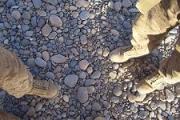GBNT73,
Interesting rant. On SWC we generally find it polite
to post an intro here, so we have an idea of your background, experience, and what basis your opinions are formed from before calling me and many others on this board an amateur idiot.
As to the above qyote - horsesh*t. You lost me at the "SF has it all figured out and those idiot GPF'ers hate SF too much to listen to them".
As a GPF'er, some SF teams have been great at COIN and others not so much. Mileage varies as much in SF as in GPF units. Secondly, if SF has the experience, why weren't they sharing it with the GPF? JFK school was offered to help write FM 3-24, and as I understand turned it down because they didn't want to help the GPF get in their rice bowl. In fact, I've been told as much over beers by some current JFK School doctrine types.
And finally, I'll throw my experience against any SF'er of my approximate age any day. We may have had a rough start, but there's a number of us who have learned quick around here, and done quite well, and not always by accident.
We welcome your discussion, but keep the generalized attacks to a minimum.







 "A Sherman can give you a very nice... edge."- Oddball,
"A Sherman can give you a very nice... edge."- Oddball,  However, there was a prevailing culture in the conventional army prior to OIF 3 that was reluctant to adapt to the reality of the situation we were involved in. I will call it COIN, but prefer CSIS"s phrase "Armed Nation Building".
However, there was a prevailing culture in the conventional army prior to OIF 3 that was reluctant to adapt to the reality of the situation we were involved in. I will call it COIN, but prefer CSIS"s phrase "Armed Nation Building". 



 -- that is a hotly debated topic on teh SOF side of the military house. Many of us firmly believe in an Irregular Warfare Command, for a variety of reasons. I don't know if there is a place in this webiste for that debate already, but I could go into it -- since that was a heavily considered sultio to our (SOF) bureaucratic ills.
-- that is a hotly debated topic on teh SOF side of the military house. Many of us firmly believe in an Irregular Warfare Command, for a variety of reasons. I don't know if there is a place in this webiste for that debate already, but I could go into it -- since that was a heavily considered sultio to our (SOF) bureaucratic ills.

Bookmarks